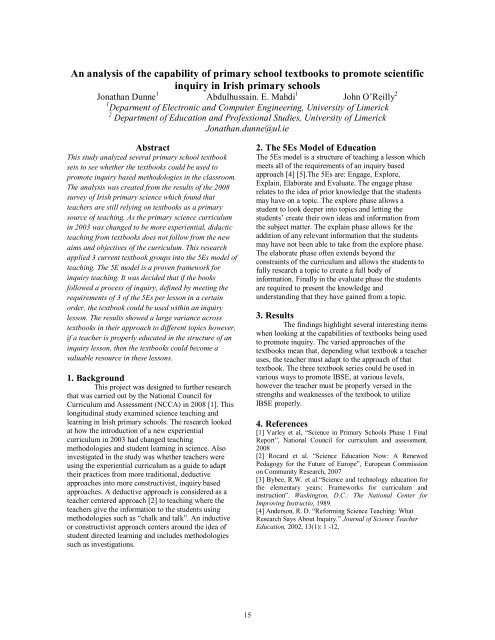NUI Galway – UL Alliance First Annual ENGINEERING AND - ARAN ...
NUI Galway – UL Alliance First Annual ENGINEERING AND - ARAN ...
NUI Galway – UL Alliance First Annual ENGINEERING AND - ARAN ...
You also want an ePaper? Increase the reach of your titles
YUMPU automatically turns print PDFs into web optimized ePapers that Google loves.
An analysis of the capability of primary school textbooks to promote scientific<br />
inquiry in Irish primary schools<br />
Jonathan Dunne 1 Abdulhussain. E. Mahdi 1 John O’Reilly 2<br />
1 Deparment of Electronic and Computer Engineering, University of Limerick<br />
2 Department of Education and Professional Studies, University of Limerick<br />
Jonathan.dunne@ul.ie<br />
Abstract<br />
This study analyzed several primary school textbook<br />
sets to see whether the textbooks could be used to<br />
promote inquiry based methodologies in the classroom.<br />
The analysis was created from the results of the 2008<br />
survey of Irish primary science which found that<br />
teachers are still relying on textbooks as a primary<br />
source of teaching. As the primary science curriculum<br />
in 2003 was changed to be more experiential, didactic<br />
teaching from textbooks does not follow from the new<br />
aims and objectives of the curriculum. This research<br />
applied 3 current textbook groups into the 5Es model of<br />
teaching. The 5E model is a proven framework for<br />
inquiry teaching. It was decided that if the books<br />
followed a process of inquiry, defined by meeting the<br />
requirements of 3 of the 5Es per lesson in a certain<br />
order, the textbook could be used within an inquiry<br />
lesson. The results showed a large variance across<br />
textbooks in their approach to different topics however,<br />
if a teacher is properly educated in the structure of an<br />
inquiry lesson, then the textbooks could become a<br />
valuable resource in these lessons.<br />
1. Background<br />
This project was designed to further research<br />
that was carried out by the National Council for<br />
Curriculum and Assessment (NCCA) in 2008 [1]. This<br />
longitudinal study examined science teaching and<br />
learning in Irish primary schools. The research looked<br />
at how the introduction of a new experiential<br />
curriculum in 2003 had changed teaching<br />
methodologies and student learning in science. Also<br />
investigated in the study was whether teachers were<br />
using the experiential curriculum as a guide to adapt<br />
their practices from more traditional, deductive<br />
approaches into more constructivist, inquiry based<br />
approaches. A deductive approach is considered as a<br />
teacher centered approach [2] to teaching where the<br />
teachers give the information to the students using<br />
methodologies such as “chalk and talk”. An inductive<br />
or constructivist approach centers around the idea of<br />
student directed learning and includes methodologies<br />
such as investigations.<br />
15<br />
2. The 5Es Model of Education<br />
The 5Es model is a structure of teaching a lesson which<br />
meets all of the requirements of an inquiry based<br />
approach [4] [5].The 5Es are: Engage, Explore,<br />
Explain, Elaborate and Evaluate. The engage phase<br />
relates to the idea of prior knowledge that the students<br />
may have on a topic. The explore phase allows a<br />
student to look deeper into topics and letting the<br />
students’ create their own ideas and information from<br />
the subject matter. The explain phase allows for the<br />
addition of any relevant information that the students<br />
may have not been able to take from the explore phase.<br />
The elaborate phase often extends beyond the<br />
constraints of the curriculum and allows the students to<br />
fully research a topic to create a full body of<br />
information. Finally in the evaluate phase the students<br />
are required to present the knowledge and<br />
understanding that they have gained from a topic.<br />
3. Results<br />
The findings highlight several interesting items<br />
when looking at the capabilities of textbooks being used<br />
to promote inquiry. The varied approaches of the<br />
textbooks mean that, depending what textbook a teacher<br />
uses, the teacher must adapt to the approach of that<br />
textbook. The three textbook series could be used in<br />
various ways to promote IBSE, at various levels,<br />
however the teacher must be properly versed in the<br />
strengths and weaknesses of the textbook to utilize<br />
IBSE properly.<br />
4. References<br />
[1] Varley et al, “Science in Primary Schools Phase 1 Final<br />
Report”, National Council for curriculum and assessment,<br />
2008<br />
[2] Rocard et al. “Science Education Now: A Renewed<br />
Pedagogy for the Future of Europe”, European Commission<br />
on Community Research, 2007<br />
[3] Bybee, R.W. et al.“Science and technology education for<br />
the elementary years: Frameworks for curriculum and<br />
instruction”. Washington, D.C.: The National Center for<br />
Improving Instructio, 1989.<br />
[4] Anderson, R. D. “Reforming Science Teaching: What<br />
Research Says About Inquiry.” Journal of Science Teacher<br />
Education, 2002, 13(1): 1 -12,
















